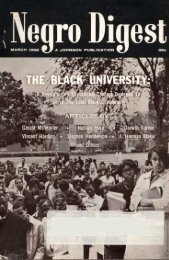3. Strain, Christopher Barry. “Civil Rights and ... - Freedom Archives
3. Strain, Christopher Barry. “Civil Rights and ... - Freedom Archives
3. Strain, Christopher Barry. “Civil Rights and ... - Freedom Archives
Create successful ePaper yourself
Turn your PDF publications into a flip-book with our unique Google optimized e-Paper software.
with civil <strong>and</strong> political rights than with fundamental human rights ; consequently, he<br />
c+ecognized "the right of self-preservation" as "the most basic of human rights."~<br />
His ideas did not stem from his formal education 9~ Instead, they sprouted directly<br />
from his personal experience as a black man living in the American South . As an<br />
"organic intellectual ;' he was one of the most influential theoroticians the civil rights<br />
movement produced' Unlike some of the other orators <strong>and</strong> writers commenting on race<br />
relations in the United States, his ideas had a plain, unpolished quality, originating in his<br />
daily trials in Monroe .<br />
Despite the wild trajectory of his life in exile, Robert Williams was not<br />
particularly unique in Afro-American history. Certainly his courage <strong>and</strong> forward<br />
~Williams, "Reflections of an Exiled <strong>Freedom</strong> Fighter," unpublished manuscript,<br />
Box 2, Undated Folder 1, Robert F . Williams Collection, Bentley Historical Library,<br />
University of Michigan .<br />
93Williams did attend college . Taking advantage of the G .I. Bill, he decided to go to<br />
college near Monroe to be near his family. After brief stints at both West Virginia State<br />
College <strong>and</strong> North Carolina College at Durham, he settled at Johnson C . Smith College in<br />
Charlotte until his GI benefits ran out in 1952 . Financial necessity forced him to leave<br />
college <strong>and</strong> find work to support his family. See Cohen, Black Crusader, 47-56.<br />
~In describing the life of civil rights activist Ivory Pony, George Lipsitz has applied<br />
the ideas of Antonio Gramsci, Italian theorist <strong>and</strong> Marxist, to the civil rights movement .<br />
Using Gramsci's concept of the "organic intellatual," Lipsitz has described how Perry<br />
held no formal status as intellectual or theorist, but still shaped the ideas <strong>and</strong> actions of an<br />
entire population group through his activism, <strong>and</strong> by involving people in "social<br />
contestation :' Organic intellectuals learn about the world by trying to change it . Like<br />
Pent', Williams personifies the quintessential organic intellectual . See Lipsitz, A Life in<br />
the Strugg e: No Perrv <strong>and</strong> the Culture of Onp~jlj~II (Philadelphia : Temple University<br />
Press, 1988), 9-11 ; see also Antonio Gramsci, Selections from the Prison Notebooks, ed.<br />
Quintin Hoare <strong>and</strong> Geoffrey Nowell Smith (New York : International Publishers, 1971), 9,<br />
10.<br />
'sAs Man: Schleifer pointed out in the epilogue of the second edition of Negioes With<br />
72
















